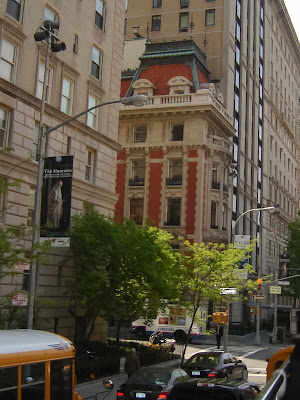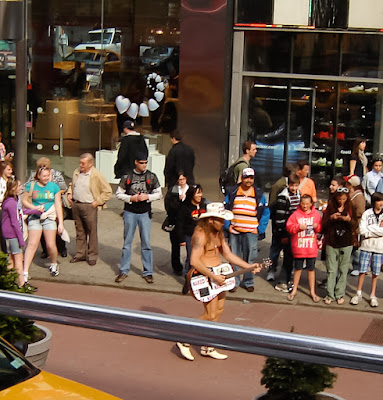From Dave Brigham:
Recently this thought struck me like a runaway freight train: I visited New York City three times between 2010 and 2016 and I didn't post anything about my trips!!!
Granted, it's only in more recent years that I've become obsessive about chronicling places in Greater Boston and cities that I visit on vacation (Seattle, Chicago, Panama City). As well, I've gotten much better at editing my photos in that time. What that means is a) there aren't as many photos in this post as you might expect and b) those photos aren't always as good as I'd like them to be.
Anyway, I dug through my archives, found a bunch of useable photos, and decided to post whatever the blog equivalent of latergrams is. This is the last of four posts.
Links to the previous posts are at the bottom of this one.
I shot the photos in this post from a double-decker tour bus as we rode through Upper Manhattan and Harlem.
Let's start with one of the most well-known buildings in New York City.

Although I took this photo nearly six years ago, I had a good guess as to what this building is. But I turned to my Facebook experts to confirm my suspicions. This, as many of you already know, is The Dakota, which is best known as the place where John Lennon was murdered on December 8, 1980, by Mark David Chapman. The ex-Beatle and his wife, Yoko Ono, lived in the building. She still maintains an apartment there.
The Dakota, of course, is much more than just a famous murder scene. Built between 1880 and 1884 and designed by Henry Janeway Hardenbergh, the apartment building is located on the Upper West Side, across from Central Park. "Hardenbergh's architectural firm was commissioned to create the design for Edward Cabot Clark, head of the Singer Manufacturing Company," according to Wikipedia. "The building purportedly was named The Dakota because at the time of its construction, the area was sparsely inhabited and considered remote from the inhabited area of Manhattan, just as the Dakota Territory was considered remote. The earliest appearance of this story, however, was in a 1933 newspaper interview with The Dakota's long-time manager. Christopher Gray of The New York Times quoted the interaction thus: 'Probably it was called 'Dakota' because it was so far west and so far north.' Gray believed that the building's name stemmed from Clark's fondness for the names of the new western states and territories."
Other famous residents over the years include actress Lauren Bacall; Steely Dan co-founder Walter Becker; singer Roberta Flack; actor Boris Karloff; football coach/commentator John Madden; and financier Wilbur Ross. The building was added to the National Register of Historic Places in 1972.
Staying with the music and entertainment angle, the next spot is one of the most highly regarded theaters in the Big Apple.

Opened in 1913, the Apollo Theater "has played a major role in the emergence of jazz, swing, bebop, R&B, gospel, blues, and soul — all quintessentially American music genres," per its web site. In 1934, Leo Brecher and Frank Schiffman bought the theater from Sidney Cohen, shifting from burlesque to variety reviews. The owners focused their shows on the growing African-American population in Harlem. "Showtime at the Apollo," a TV show featuring singers, dancers, orchestras and comedians, debuted in 1955 and ran until 2008. Comedian and TV host Steve Harvey brought the show back in 2018. In 2020, the Apollo debuted a digital stage to showcase entertainment in the COVID era.

The next photo looks like a Hollywood backlot, but I don't know exactly where it is.

Thanks again to my Facebook friends who either live or once lived in Manhattan, I was able to identify the church below.

The Cathedral Church of Saint John the Divine is "the mother church of the Episcopal Diocese of New York and the Seat of its Bishop," according to its web site. Located at 1047 Amsterdam Avenue, the house of worship is "the largest Cathedral in the world, meaning a church that is also the seat of a Bishop," per its web site. "Measured by length or internal volume, it is one of the five largest church buildings in the world." As large as it is, the church, which rose in 1892, is unfinished. "Like the great Medieval cathedrals and churches of the world, St. John the Divine will continue to be constructed over many centuries. Currently, funding is directed to prioritize serving the community through our programming and social initiatives, and to maintaining the architectural integrity of the Cathedral."

I wish I'd gotten better pictures of this majestic cathedral.
I have no idea what or where the next building is, except that it's on the M72 bus line. I used Google Maps Street View to try and find it, but had no luck.

The next building, however, was easy to identify through a Google search.

This one-of-a-kind place is Masjid Malcolm Shabazz, a Sunni Muslim mosque. "Founded by Honorable Elijah Muhammad in 1956, by Nation of Islam Minister El Hajj Malik Shabazz known then as Malcolm X, Masjid Malcolm Shabazz located at 102 West 116th Street in Harlem began as Muhammad’s Temple of Islam #7," according to the mosque's web site. Malcolm X, who served time in prison before becoming a leading figure in the civil rights struggles of the 1960s, was minister here from the mosque's founding until 1965. Louis Farrakahn, a controversial figure in his own right, succeeded Malcolm X.
There are businesses on the ground floor, including a pharmacy and a barber shop. The site is also home to the Harlem Business Outreach Center.
Today this site features this distinctive building, a house of worship. Prior to that, though, the site had a less holy designation. "Before becoming a religious structure, the lot used to contain the Lenox Casino, a space which was often rented for meetings by the Socialist Party and used as a theatrical performance venue for a number of then-renowned artists," according to this article. "Built in 1905 and designed by Lorenz F. J. Weiher, the Lenox Casino was raided in 1912 for showing 'illegal films.'"
I'm unclear as to whether the casino became the mosque, or whether the mosque is a newer building. Either way, cool building and neat history.
I love the detail on the next building, but I don't know where it's located.

I've been able to identify (if it weren't already obvious) the location of the rest of the buildings/scenes. The first is the former Mickey Mantle's Restaurant.

Named for the former Yankee great and Baseball Hall of Famer, Mickey Mantle's was located on Central Park South for nearly a quarter century. The eatery closed in 2012, 17 years after Mantle passed away. I shot this photo in 2011; I initially thought we'd taken our tour-bus ride in 2016.
The next photo showcases another long-closed restaurant, located at 383 West 125th Street.

Look closely and you'll see the "Southern Fried Chicken" sign that advertised one of the specialties at soul-food place, M&G Diner. By the time I shot this photo, the Harlem eatery had been closed for a few years. But from 1964 to 2008, the diner served up homestyle cooking at reasonable prices. The building has since been revampted, with a clothing store in the former M&B space.
Next up is a view of the Park Avenue viaduct, which emerges from a tunnel to carry the Metro-North Railroad. This is the Park Avenue main line, which runs from Grand Central Station, under the city until this point, then across the Harlem River into the Bronx, where it splits into the Hudson Line and the Harlem Line.

Thanks to one of my college friends on Facebook, I learned that the cool details below are on the lower, older section of Hearst Tower. Unlike the river cruise I took in Chicago a few years back, I wasn't making notes on this jaunt....

"The Hearst Tower is...the world headquarters of media conglomerate Hearst Communications, housing many of its publications and communications companies," according to Wikipedia. "The Hearst Tower consists of two sections, with a total height of 597 feet...and 46 stories. The six lowest stories form the Hearst Magazine Building (also known as the International Magazine Building), designed by Joseph Urban and George B. Post & Sons, which was completed in 1928. Above it is the Hearst Tower addition, which was completed in 2006 and designed by Norman Foster."
One last building, before we get to the bare facts about one of the most well-known buskers in New York City.

Once again, I have a Facebook college friend to thank for sending me on a Google Maps hunt, where I figured out that this is the Benjamin N. Duke House on Fifth Avenue. "The house was built speculatively by developers William W. Hall and Thomas M. Hall....Shortly after the mansion was completed in 1901, it was bought by Benjamin N. Duke, a tobacco, textile and energy industrialist and philanthropist, who was chairman of the American Tobacco Company at that time," according to Wikipedia. "Benjamin's brother, James, another tobacco entrepreneur, bought the house in 1907. He lived there until his own mansion...was completed in 1912.
"After James Duke relocated, the mansion became the residence of Benjamin Duke's son, Angier Buchanan Duke, until 1919, when his sister Mary Lillian Duke married A. J. Drexel Biddle Jr., and the couple moved in. Later, their daughter, Mary Semans, took over the residence. Members of the Duke family owned the mansion until 2006, when it was sold for US$40 million to Tamir Sapir, an American real estate mogul.
"The Mexican telecom magnate, Carlos Slim, at the time the richest person in the world, bought the mansion four years later in 2010 for US$44 million. Slim said in an interview with CNBC that he was planning on using the house as a place to stay when he was in New York for business meetings. In May 2015, he put the mansion up for sale at $80 million, nearly twice the amount he paid for it."
As far as I can tell, Slim still owns the house.
OK, time for the butt end of this post, of this entire series. Let's give a warm, backside round of applause to someone who could use the exposure: the one, the only Naked Cowboy!

Well, that wraps up my New York City flashback series. Hope you enjoyed it!
Here are the previous posts in this series:
"New York City Flashback: Views from the High Line"

No comments:
Post a Comment